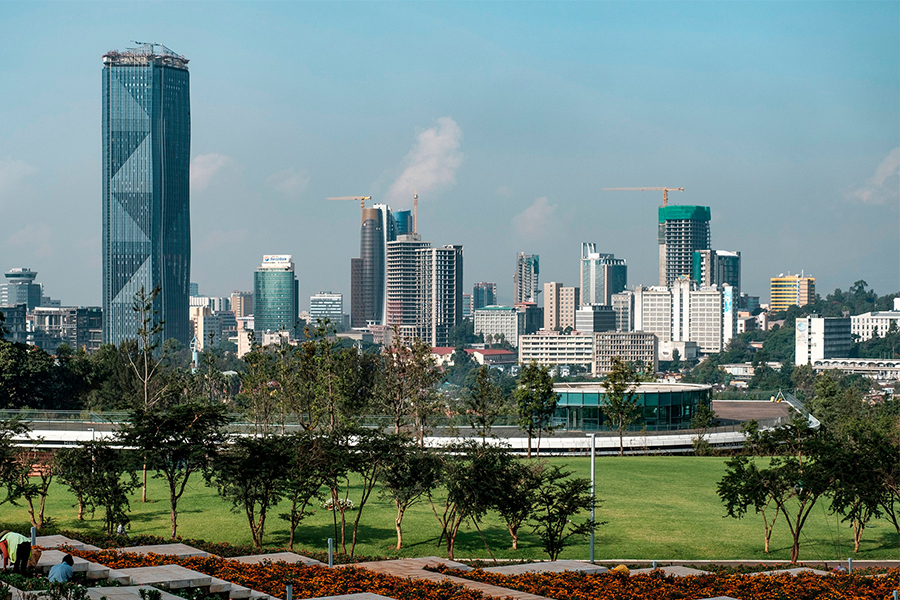
Radar | Aug 20,2024
Sep 3 , 2022
By Bjorn Lomborg
It is immoral to block the path for low-income countries to develop. Instead, rich countries need to invest massively in the innovation needed to ensure that green energy costs drop below fossil fuels, writes Bjorn Lomborg, president of the Copenhagen Consensus and visiting fellow at Stanford University's Hoover Institution.
The rich world’s fossil fuel hypocrisy is on full display in its response to the global energy crisis following Russia’s invasion of Ukraine. While the wealthy G7 countries admonish the world’s poor to use only renewables because of climate concerns, Europe and the United States are going begging to Arab nations to expand oil production. Germany is reopening coal power plants, while Spain and Italy are ramping up African gas production. So many European countries have asked Botswana to mine more coal that the country will have to triple its exports.
A single person in the rich world uses more fossil fuel energy than all the energy available to 23 poor Africans. The rich world became wealthy by massively exploiting fossil fuels, which today provides more than three-quarters of its energy. Solar and wind deliver less than 3 percent of the rich world’s energy.
Yet, the rich are choking off funding for any new fossil fuels in the developing world. Most of the world’s poorest four billion people have no meaningful energy access, so the rich blithely tell them to ‘leapfrog’ from no energy to a green nirvana of solar panels and wind turbines.
This promised nirvana is a sham consisting of wishful thinking and green marketing. The world’s rich would never accept off-grid, renewable energy themselves — and nor should the world’s poor. Consider the experience of Dharnai, a village which Greenpeace tried to turn into India’s first solar-powered community in 2014.
Greenpeace received glowing, global media attention when it declared that Dharnai would refuse “to give into the trap of the fossil fuel industry.” But the day the solar electricity was turned on, the batteries were drained within hours. A boy remembers wanting to do his homework, but there was not enough power for his family’s one lamp.
Villagers were prohibited from using fridges or TVs because they would exhaust the system. They could not use electric cookstoves, so had to continue burning wood and dung, which create terrible air pollution. Across the developing world, millions die from indoor pollution that the World Health Organisation (WHO) says is equivalent to each person smoking two packs of cigarettes daily.
Greenpeace invited the state’s chief minister to admire their handiwork. He was met by a crowd waving signs demanding “real electricity” (the kind used to run a refrigerator or a stove, and that children can use to do their homework) and not “fake electricity” (meaning solar energy that could do none of these things).
When Dharnai was finally connected to the power grid, more and more people dropped their solar connections. An academic study found a big reason was that the overwhelmingly coal-powered grid electricity was three times cheaper than the solar energy. What is more, it could actually power appliances people wanted like TVs and stoves. Today, the disused solar power system is covered in thick dust, and the project site is a cattle shed.
To be sure, solar energy can charge a cell phone and run a light, which can be useful—but it is often expensive. A new study on solar lamps in India’s most populous state shows that even with hefty subsidies, solar lamps are worth much less than their cost for most people. In rich countries like Germany and Spain, most solar and wind would never have been installed if not for subsidies.
Solar and wind are incapable of delivering the power needed for industrialisation, powering water pumps, tractors and machines — all the ingredients needed to lift people out of poverty. As rich countries are now also discovering, solar and wind energy remain fundamentally unreliable. No sun or wind means no power. Battery technology offers no answers: Globally today, there are only enough batteries to power global average electricity consumption for 1 minute and 15 seconds. Even by 2030, with a projected rapid battery scaleup, they would last less than 12 minutes. For context, every German winter, when solar is at its minimum, there is near-zero wind energy available for at least five days, or more than 7,000 minutes.
This is why the rich world is on-track to continue to mostly rely on fossil fuels for decades. The International Energy Agency (IEA) estimates that even if all current climate promises are delivered, fossil fuels will still constitute two-thirds of the rich world’s energy in 2050. The developing world sees the hypocrisy, as elegantly formulated by Nigeria’s vice-president, Yemi Osinbajo.
“No one in the world has been able to industrialise using renewable energy,” he said. Yet, Africa has “been asked to industrialise using renewable energy when everybody else in the world knows that we need gas-powered industries for business.”
Instead of immorally blocking the path for other countries to develop, rich countries need to invest massively in the innovation needed to ensure that green energy costs drop below fossil fuels. This way, everyone in the world will be able to afford to switch to renewable alternatives. Insisting that the world’s poor live without fossil fuels is virtue signaling that plays with other people’s lives.
PUBLISHED ON
Sep 03,2022 [ VOL
23 , NO
1166]


Radar | Aug 20,2024

Sponsored Contents | Jun 15,2022

Radar | Jan 19,2019

Addis Fortune Press Release | Oct 04,2024

Fortune News | Sep 08,2024

Fortune News | Nov 09,2024

News Analysis | May 25,2024

Featured | Nov 16,2024

Agenda | Jan 18,2020

View From Arada | Jun 04,2022

Photo Gallery | 177472 Views | May 06,2019

Photo Gallery | 167679 Views | Apr 26,2019

Photo Gallery | 158342 Views | Oct 06,2021

My Opinion | 136987 Views | Aug 14,2021
Commentaries | Oct 25,2025

Dec 22 , 2024 . By TIZITA SHEWAFERAW
Charged with transforming colossal state-owned enterprises into modern and competitiv...

Aug 18 , 2024 . By AKSAH ITALO
Although predictable Yonas Zerihun's job in the ride-hailing service is not immune to...

Jul 28 , 2024 . By TIZITA SHEWAFERAW
Unhabitual, perhaps too many, Samuel Gebreyohannes, 38, used to occasionally enjoy a couple of beers at breakfast. However, he recently swit...

Jul 13 , 2024 . By AKSAH ITALO
Investors who rely on tractors, trucks, and field vehicles for commuting, transporting commodities, and f...

Oct 25 , 2025
The regulatory machinery is on overdrive. In only two years, no fewer than 35 new pro...

Oct 18 , 2025
The political establishment, notably the ruling party and its top brass, has become p...

Oct 11 , 2025
Ladislas Farago, a roving Associated Press (AP) correspondent, arrived in Ethiopia in...

Oct 4 , 2025
Eyob Tekalegn (PhD) had been in the Governor's chair for only weeks when, on Septembe...

Oct 25 , 2025 . By YITBAREK GETACHEW
Officials of the Addis Abeba's Education Bureau have embarked on an ambitious experim...

Oct 26 , 2025 . By YITBAREK GETACHEW
The federal government is making a landmark shift in its investment incentive regime...

Oct 26 , 2025 . By NAHOM AYELE
The National Bank of Ethiopia (NBE) is preparing to issue a directive that will funda...

Oct 26 , 2025 . By SURAFEL MULUGETA
A community of booksellers shadowing the Ethiopian National Theatre has been jolted b...